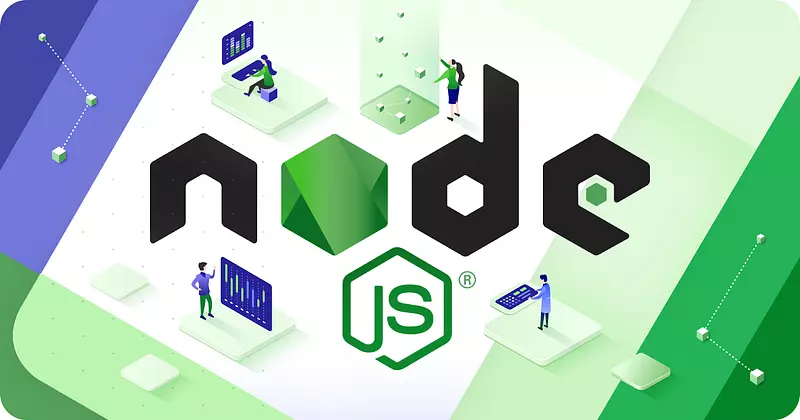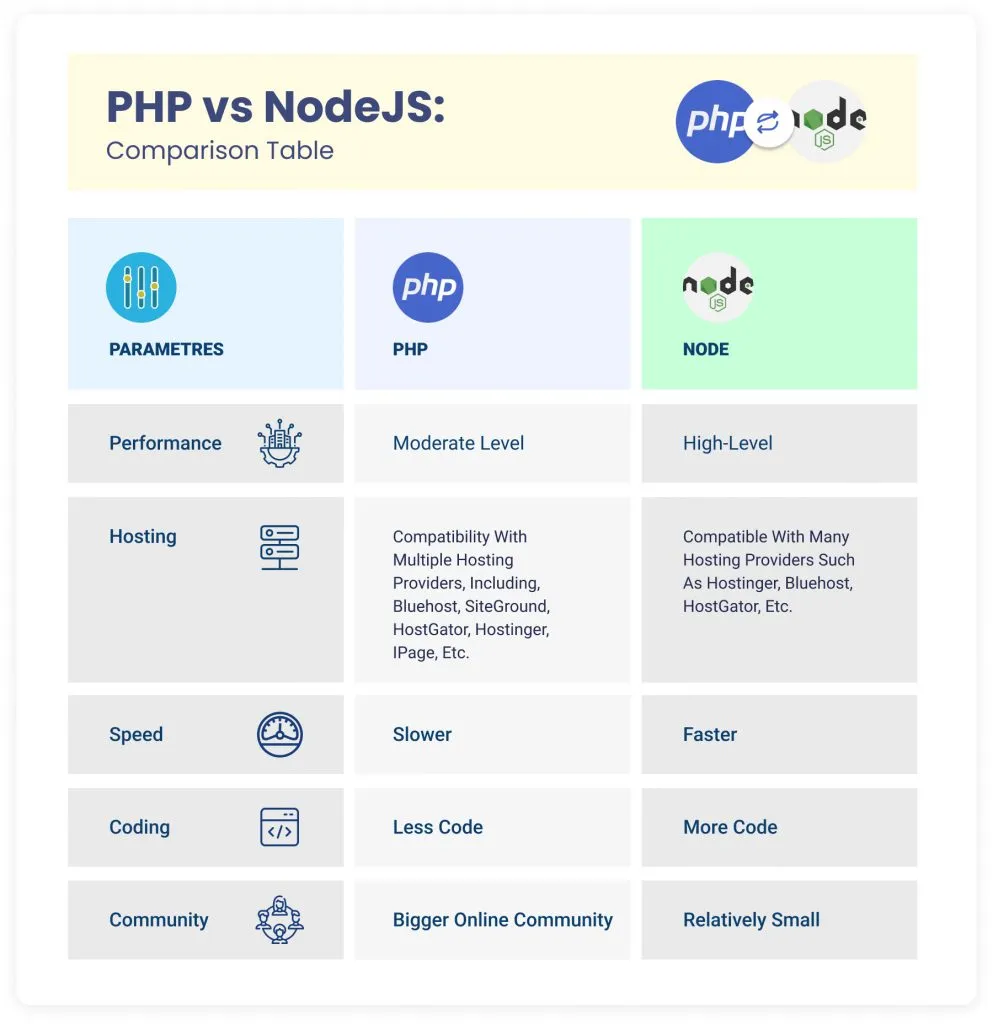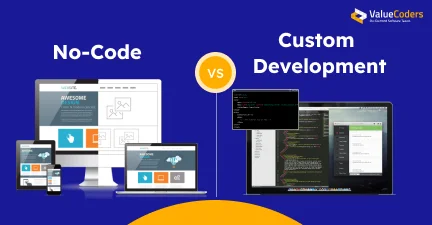Many Backend technology options are available today, but not all of them are created equal. When it comes to the web, PHP and NodeJS are two of the most popular backend technologies, with both having their respective strengths and weaknesses that make them more or less suitable in certain situations.
Both PHP and NodeJS are excellent choices for building web applications or web services. To help you make an informed decision, we’ve prepared a detailed comparison of PHP vs NodeJS based on how each technology stacks up against one another in terms of performance, community support, usability, reliability, security, and flexibility.
Let’s get started!
NodeJS Overview
Node.js (or simply Node) is a platform built on Chrome’s JavaScript (JS) runtime for building fast & scalable network applications. Node.js uses an event-driven, non-blocking I/O model that makes it lightweight, efficient, and flawless for data-intensive real-time applications that run across distributed devices.
Initially released in 2009, it has grown to become one of the most popular languages used in web development today. While written entirely in JavaScript (JS) and running primarily on Linux servers, it has actually been described as one of those technologies you can use to build almost anything: APIs, web applications, and even mobile apps.
- 85% use NodeJS primarily for web app development.
- LinkedIn, Amazon, eBay, Netflix, Reddit, Tumblr, and PayPal use NodeJS.
If you want to develop a multi-functional application using Node, hire Node developers working in one of the best software product development companies.
PHP Overview
PHP began as a front-end language, but it has evolved over time to include server-side capabilities. Its role continues to expand with each passing year. As of now, PHP has become so advanced that you can use it to develop fully functional sites and applications capable of running on any kind of system.
Companies can choose between different options in order to create a powerful and flexible system with useful features. It’s also worth mentioning that PHP developers are always at an advantage because their experience allows them to build secure websites, web apps, and software for mobile devices like phones and tablets.
- 45170 corporations use PHP in their tech stacks, including Facebook, Delivery Hero, and Slack.
- PHP is utilized by 77.6% of all websites. (W3Techs)
Also Read: Node.js vs. Golang: Who Will Win The Race of Backend Development?
Partner with us for cutting-edge PHP and NodeJS development services.
Benefits of using NodeJS
The benefits of using NodeJS are many and varied, but some of the most notable include:
Fast
One of the major reasons why Node is so popular is because it’s built on Google Chrome’s V- eight JavaScript engine, which makes it extremely fast. In fact, it’s one of the fastest backend technologies available today.
This speed advantage allows you to develop applications that are more responsive and have a better user experience. Not to mention, it also makes NodeJS ideal for building real-time applications such as chatbots and gaming apps.
Scalable
Another big selling point of NodeJS is its scalability. This means that you can easily add new features or functionalities to your application without having to rewrite the entire codebase.
This is because NodeJS uses a non-blocking I/O model, which makes it very efficient in handling multiple concurrent connections with minimal overhead. As a result, NodeJS can easily scale to support large numbers of users without sacrificing performance.
Large and active community
Since NodeJS is an open-source platform, it has a large and active community of developers who are constantly working on improving the technology.
This is critical because it means that you can always find help or support when you need it, and there are always new libraries and frameworks being created for NodeJS.
Usability
NodeJS is also very user-friendly, thanks to its JavaScript roots. This means that if you’re already familiar with JavaScript, then you’ll be able to pick up NodeJS relatively easily.
In fact, many front-end developers are now using NodeJS for backend development because of how easy it is to use.
Reliable
Another big advantage of using NodeJS is that it’s very reliable. This is because it uses a mode called “event-driven programming,” which allows the server to handle multiple requests simultaneously without running into any errors.
As a result, you can be confident that your NodeJS application will be able to handle a large number of users without any issues.
Related Blog: Top 10 Advantages of Using NodeJS
Disadvantages of using NodeJS
There are some disadvantages of using NodeJS, although most of these are minor. Some of the main disadvantages include:
Not suitable for CPU-intensive tasks
One of the main disadvantages of NodeJS is that it’s not well suited for CPU-intensive tasks. This is because the JavaScript engine it’s built on is single-threaded, which means that only one task can be processed at a time.
So, if your application needs to perform a lot of computationally intensive tasks, then NodeJS is not the best choice. In these cases, you’re better off with a technology that uses multiple threads or processes, such as PHP.
Steep learning curve
Another downside of NodeJS is that it has a steep learning curve, particularly for beginners. This is because NodeJS uses a lot of concepts that are not familiar to most developers, such as event loops and callbacks.
As a result, it can take some time to get up to speed with NodeJS. However, once you’ve mastered the basics, you’ll find that NodeJS is actually quite easy to use.
Stay ahead with our forward-thinking PHP and NodeJS solutions.
Benefits of using PHP
PHP is a tried and tested backend technology that has been around for over two decades. In that time, it’s become one of the most popular backend technologies in the world, powering millions of websites and applications.
If you are also thinking of creating a leading site for your business, then hire PHP developers, as they will really help you make your site outstanding and feature-rich.
Well-established
One of the main benefits of PHP is that it’s well-established. This means that it has a large community of developers who are constantly working on improving the language.
As a result, you can always find help or support when you need it, and there are always new libraries and frameworks being created for PHP.
Efficient Performance
PHP is also very efficient, thanks to its use of an opcode cache. This means that your PHP application will run faster and require less memory than other languages.
As a result, you’ll be able to save money on hosting costs, and your users will enjoy a better experience.
Easy to use
PHP is also very user-friendly, thanks to its simple syntax. This means that it’s easy to pick up, even for beginners.
In fact, many front-end developers are now using PHP for backend development because of how easy it is to use.
Reliable
Another big advantage of using PHP is that it’s very reliable. This is because it uses a mode called “event-driven programming,” which allows the server to handle multiple requests simultaneously without running into any errors.
As a result, you can be confident that your PHP application will be able to handle a large number of users without any issues.
Cost-Efficient
One of the main edges of PHP is that it’s very cost-effective. This is because it’s an open-source language, which means that you don’t have to pay for licenses or support.
As a result, you can save money on development costs, which makes PHP an appealing alternative for small businesses and startups.
Related Blog: PHP Is Incredibly Better Than Its Other Alternatives For Web Projects
Disadvantages of using PHP
There are some disadvantages of using PHP, although most of these are minor. Some of the main disadvantages include:
Not suitable for large applications
One of the main disadvantages of PHP is that it’s not well suited for large applications. This is because it’s not very scalable, and it can be difficult to maintain a large codebase.
As a result, if your application is likely to grow over time, then you may want to consider using a different language such as NodeJS.
Not the best choice for high-traffic sites
Another downside of PHP is that it’s not the best choice for high-traffic sites. This is because it’s not very efficient, and it can struggle to handle a large number of requests.
As a result, if your site is likely to experience a lot of traffic, then you may want to consider using a different language such as NodeJS.
Moreover, outsourcing software product development services can be helpful for you to develop an excellent website for your business.
Related Post: 7 Stages In Software Product Development
NodeJS vs PHP: Which One Is Best?
The debate between NodeJS and PHP is one that has been going on for years, and there’s no clear winner. Here have compared the few parameters that will help you decide which one is better for your project.
1. Speed and Performance
In terms of performance, PHP and Node.js are very similar in performance, based on an event-driven approach to handling requests. However, there are several differences in how they handle concurrency compared to others.
The most obvious difference with respect to concurrency is that while PHP uses multiple processes, each with its own memory space, Node uses a single process with shared memory space and asynchronous communication via message passing.
The upside of using a single process (no fork/exec) is that it has significantly better performance than PHP for small-scale applications and those applications that need high response times.
On the other hand, because no child processes are created in case of an error or crash, it means that all application state information would be lost, resulting in data loss.
2. Development Kit
The setup process for both PHP and Node.js was quite easy. Both are supported by some of today’s most popular IDEs, such as WebStorm, PhpStorm, Sublime Text 2, and Visual Studio 2013. This makes setting up your environment quite fast and painless.
PHP comes with PEAR, which includes a number of libraries useful for web development (Zend Framework, Symfony2). Likewise, Node comes with npm, which provides over 10K modules that you can use on your project (Express Framework).
Both platforms are very well documented and have extensive communities that love to help you whenever you need it. Overall, both platforms provide a friendly environment to start developing fast and easily.
3. Environment
PHP and Node have a few things in common, but also many things that are different. The biggest difference between them is their environment: PHP runs on a server, while Node runs on a client (like your browser). This means that if you’re using PHP, you’ll need to install it on a web server (like Apache or Nginx) before you can run your code.
If you’re using Node, however, all you need to do is download an executable file from Node’s website and then run it. If it’s your first time running a program like that, there will be some configuration options that pop up so you can set up your file path.
Drive your project to success with our unparalleled PHP and NodeJS expertise.
4. Database
The biggest advantage of using PHP with MySQL over Node.js and MongoDB is that if you’re coming from a background in PHP, then it will be very easy to get up and running with your data.
The command-line tools are similar to those used in MySQL, so you can get started easily. The software also plays well with Windows environments, which makes PHP a great option if you’re already working on projects that use SQL databases.
While there are some different commands involved when creating a new database or table in MongoDB compared to MySQL, the basic steps of getting your code up and running aren’t too far off what they would be if you were working with MySQL.
5. Hosting
As you consider which language to learn first, consider what kind of hosting will be available once you’re ready to create your website. PHP is supported by most shared hosting plans, and there are WordPress plugins that make it easy to add a dynamic component.
If you opt for NodeJS, you may have trouble finding shared hosting that allows it. In fact, VPS or dedicated server space may be required. The latter option can get pricey quickly and might not be within reach if your budget is limited.
It’s important to take cost into consideration when deciding on a programming language because starting from scratch — both with development tools and web hosting — can add up quickly. To mitigate costs, seeking out an affordable dedicated server in the US could provide a balance between functionality and budget constraints.
PHP vs NodeJS: Comparison Table
Conclusion
Both Node and PHP are great backend technologies, but they’re quite different. If you’re coming from a PHP background, then it might be easier to get up and running with MySQL.
Node.js is great for small-scale applications that need high response times. However, because no child processes are created in case of an error or crash, all application state information would be lost, resulting in data loss.
The decision of whether to use PHP or Node really comes down to your own preferences and the project you’re working on. Moreover, you can hire NodeJS developers or hire PHP developers from the best software development company (ValueCoders) to make efficient use of technologies in web app development.








